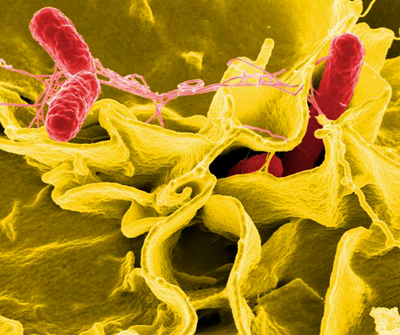Ask Dr. Universe: What bacteria make us get stomach bugs?

Washington State University
Dr. Universe: What bacteria make us get stomach bugs? – Austin, 9, Texas
Dear Austin,
There are all kinds of tiny pathogens, including bacteria and viruses, in our world. Some of them are helpful and do things like keep the human gut healthy – but there are others that can make us quite sick.
I talked to my friend Alan Goodman about it. He’s an associate professor at Washington State University who knows a lot about the pathogens that can cause illness in people and other animals.
When we talk about stomach bugs, usually we think of pathogens that cause the stomach flu. If you wanted to call the infection by its official name, you could say “viral gastroenteritis.” But we’ll stick with stomach flu for now.
The stomach flu isn’t influenza. Goodman said we might call influenza “the flu,” but influenza actually impacts the nose, throat and lungs. The stomach flu causes trouble in the stomach and intestines that make up the gastrointestinal system.
The culprit behind the stomach flu is often norovirus. Norovirus is a sphere-shaped virus that is really good at spreading from person to person.
This virus can sometimes spread through tiny particles of poop, which is part of the reason it’s really important to wash our hands after we go to the bathroom.
When we wash our hands properly, it can help prevent all kinds of germs from getting into our bodies. It also keeps our germs from spreading to other people.
If norovirus does get into the body, it can create some changes in the digestive system and intestines. It can make the body react in unpleasant ways, such as causing diarrhea or vomiting. Thankfully, that usually only lasts for a couple of days before a person starts feeling better.
Meanwhile, there are also some bacteria called salmonella and E. coli that can cause stomach troubles. These bacteria might be living on uncooked poultry, raw eggs or unwashed vegetables. That’s why it’s important to keep food safety in mind when cooking or eating certain foods.
Unfortunately, there isn’t a perfect treatment for these kinds of “stomach bugs.” You just have to let your body’s immune system – which works to protect you – do its best to fight back.
But the good news is there are also some things we can do to help illness from striking in the first place.
If you haven’t already taken note by now, one thing we can do to avoid spreading around pathogens is to wash our hands after we use the bathroom and before and after we prepare or eat food.
A lot of pathogens can spread pretty quickly and easily, so if you are sick, it’s good to stay home from school if you can. That way the virus or bacteria doesn’t have as much of a chance to spread to other people.
When we take these thoughtful measures, we can help ourselves, along with our family and friends, stay safe and healthy.
Sincerely,
Dr. Universe
Know a kid with a science question? Adults can help kids submit a question at askdruniverse.wsu.edu/ask for a chance to be featured in a future video, podcast or Q&A post.